The
Executors
Handbook
Fourth Edition
A STEP-BY-STEP GUIDE TO SETTLING AN ESTATE
FOR PERSONAL REPRESENTATIVES,
ADMINISTRATORS, AND BENEFICIARIES
THEODORE E. HUGHES
AND DAVID KLEIN

Skyhorse Publishing
This book is designed to provide accurate and authoritative information
in regard to the subject matter covered. It is sold with the
understanding that the author and the publisher are not engaged
in rendering legal, accounting, or other professional services. If
legal advice or other expert assistance is required, the services of a
competent professional person should be sought.
Copyright 1994, 2001, 2007, 2013 by Theodore E. Hughes and David Klein
Text new to this and 2007 edition Copyright 2007, 2013 by Theodore E. Hughes
All Rights Reserved. No part of this book may be reproduced in any manner without the express written consent of the publisher, except in the case of brief excerpts in critical reviews or articles. All inquiries should be addressed to Skyhorse Publishing, 307 West 36th Street, 11th Floor, New York, NY 10018.
Skyhorse Publishing books may be purchased in bulk at special discounts for sales promotion, corporate gifts, fund-raising, or educational purposes. Special editions can also be created to specifications. For details, contact the Special Sales Department, Skyhorse Publishing, 307 West 36th Street, 11th Floor, New York, NY 10018 or info@skyhorsepublishing.com.
Skyhorse and Skyhorse Publishing are registered trademarks of Skyhorse Publishing, Inc., a Delaware corporation.
Visit our website at www.skyhorsepublishing.com.
10 9 8 7 6 5 4
eISBN: 978-1-62873-842-1
Library of Congress Cataloging-in-Publication Data is available on file.
ISBN: 978-1-62636-421-9
Printed in the United States of America
CONTENTS
Managing, Distributing, and Closing
the Probate Estate
TABLES
Eligibility of Nonresident Executors, by State |
The Executors DutiesA Summary |
Executors Fees, by State |
Features of POD, Totten Trust, and TOD Accounts |
States Allowing TOD Deeds of Real Estate |
States Allowing TOD Registration of Vehicles |
Legal Consequences of Various Forms of Ownership |
Funeral and Body Disposal Alternatives |
Requirements for Small Estate Transfer by Affidavit Procedures, by State |
Requirements for Small Estate Summary Probate Procedures, by State |
Priority Order for Appointment of Executor |
Time Limits for Submitting Creditors Claims |
Federal Estate Tax Exemption Equivalents |
State Inheritance Tax Rates and Exemptions |
State Estate Tax Rates and Exemptions |
Priority Order for Appointment of Administrator |
Intestate Succession under the Uniform Probate Code |
FIGURES
Topics for a Letter of Instruction |
Durable Financial Power of Attorney |
Durable Medical Power of Attorney |
Living Will |
Petition and Order to Open Safe-Deposit Box |
Safe-Deposit Box Certificate and Receipt |
Published Notice Seeking Will |
Organ Donor Card |
Petition for Probate and Appointment of Executor |
Executors Bond |
Letters of Authority |
Inventory |
Published Notice to Creditors |
Creditors Statement and Proof of Claim |
Receipt of Distributive Share |
Executors Account |
Order Discharging Executor |
Petition to Reopen Estate |
A NOTE TO
THE READER
Although we have made every attempt to ensure that the information in this book is accurate, comprehensive, and current, we cannot predict the ways in which both state and federal laws and court rules may change, nor can we know the complexities of the estate with which you may be confronted.
For this reason, you must not consider this work as your tax accountant or estate lawyer in book form. Most estates are fairly simple and present no special problems. But if you find that the matters you are dealing with challenge your personal skills, you should not hesitate to employ professional help. The adage about an ounce of prevention has special relevance in connection with estate settlement, because it can bring to a swift conclusion probate proceedings, benefit claims, and tax issues that might otherwise drag on for months or years.
A word may be in order about the gender of our pronouns. In our efforts to maintain a minimally decent prose style, we have tried to avoid the awkward he or she as often as possibleespecially when it is antecedent to the grammatically barbarous they. Because males generally die at an earlier age than females, we have used he wherever we refer to the testator or the deceased. Similarly, we use she in reference to the surviving spouse. We hope that nobody takes offense at this seemingly sexist but basically sensible usage.
T. E. H.
D. K.
THE EXECUTOR
I had a friend who died and he
On earth so loved and trusted me
That when he quit this worldly shore
He made me his executor.
He asked me through my natural life
To guard the interest of his wife;
To see that everything was done
Both for his daughter and his son.
I have his money to invest,
And though I try my level best
To do that wisely, Im advised.
My judgment often is criticized.
His widow, once so calm and meek,
Comes, hot with rate, three times a week
And rails at me because I must,
To keep my oath, appear unjust.
His children hate the sight of me,
Although their friend Ive tried to be,
And every relative declares
I interfere with his affairs.
Now when I die Ill never ask
A friend to carry such a task.
Ill spare him all such anguish sore
And leave a hired executor.
by Edgar A. Guest

Part I
THE ROLE OF
THE EXECUTOR

1

WHEN DEATH OCCURS
An executor is a person, bank, or trust company nominated in a will to carry out the wishes of the deceased and to do whatever is necessary to settle the deceaseds probate estate. If a testator, one who signs a will, has nominated you to this position, what you can do, should do, and must do depends on when you are nominated; on your relationship with the testator; and on the nature and value of the testators probate assets.
If, for example, you know months or years before the testators death that you have been nominated, there is much that you can suggest to simplifyand perhaps eliminateyour job and to save the survivors a substantial amount of money in probate costs, death taxes, and other expenses, as well as the time and frustration of having to deal with a county court (usually called a probate court, but in some states called a surrogate, orphans, or chancery court). We will deal with this in detail in .

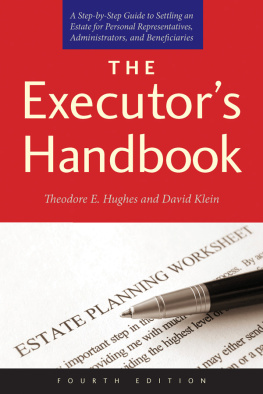

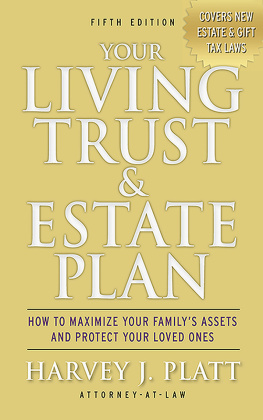
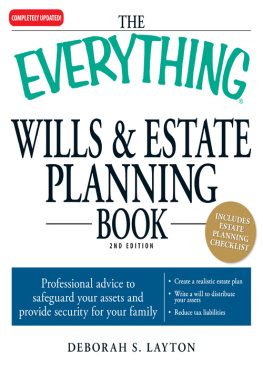
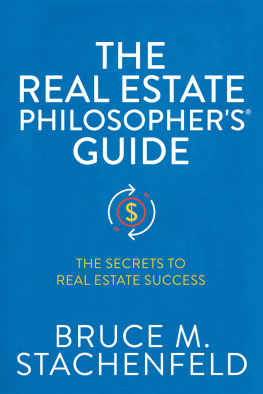
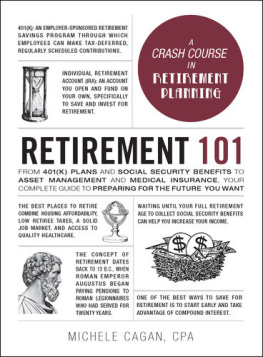
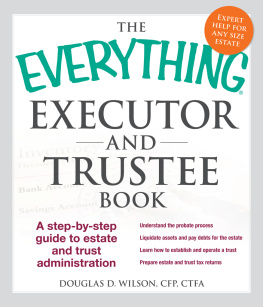
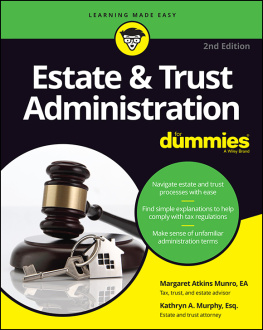



 1
1 